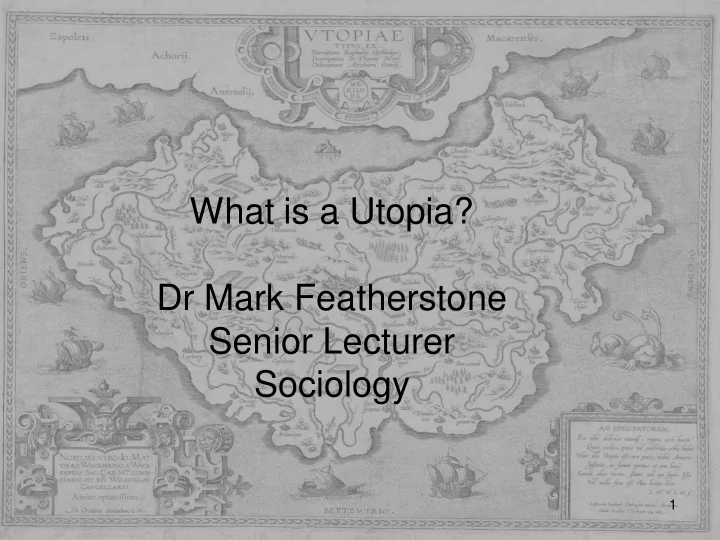

What is a Utopia? Dr Mark Featherstone Senior Lecturer Sociology 1
Part 1 What is Utopia?
Sociology and Utopias • What is the point of sociology? • The aim of sociology is to think creatively about social problems and to try to solve them. • In ‘utopian’ this way there is a dimension to sociology. • As a discipline, sociology is concerned with thinking about how we could make a good society. 3
What is Utopia? • In 1516 Thomas More wrote about a perfect society that was everything the real world was not. • There was no money or inequality in More’s society and there was little or no crime. • More called his society Utopia . 4
Ever since More wrote about utopia, and perhaps long before he put pen to paper, people have tried to design perfect worlds … . 5
Real and Imagined These perfects world have been both real and imagined and some have been much more realistic than others. 6
Part 2 Utopian Themes
Utopias • Let’s think about four utopias: – Plato’s Republic (Ancient Greece) – Marquis De Sade’s Society of Crime (French Revolutionary France) – Karl Marx’s Communist Society (19 th Century Britain) – Steve Jobs’ Hi-Tech World (Today). 8
Plato’s Republic • The first utopia was Plato’s Republic . • Plato wrote his Republic sometime around 380BC. • He imagined a perfectly ordered society of reason and discussion. • The Republic is a utopia of education, where the best (his Philosopher Kings) people make the rules. 9
The Myth of the Cave 10
Other Key Themes • Plato also thought that the family was a bad idea, so he abolished family childcare. • In his utopia children would be raised by nurseries run by people who are skilled at producing good people. • In Plato’s view all that matters is the well structured society. 11
The Marquis De Sade 2000 years after Plato wrote his Republic the infamous French writer and libertine of the 18 th century the Marquis de Sade invented a utopia of sorts, a utopia of total freedom. 12
13
Crime • De Sade’s utopia was a utopia of complete freedom and consequently crime. • There are no rules in Sade’s utopia. • Apart from the rule to do exactly what you want with whom you want! • This was a utopia of complete individualism. 14
Marx’s Communism 19 th Soon after De Sade, the century German writer Karl Marx began to write about communism. 15
16
Cog in a Machine • For Marx the problem with work was boredom. • He wanted to create a society where people could be creative and find work that would allow them to express themselves. • In Marx’s society nobody would be turned into a mindless workhorse, a cog in a machine. 17
Apple’s Utopia 150 years after Marx the American company, Apple, and particularly its boss, Steve Jobs, imagined a world where technology would make the world a better place (a media communication utopia). 18
19
Jobs’ Hi -Tech World • After communism failed in the 1980s we entered a period academics talk about in terms of globalisation . • In a globalised world we are all connected through new media technologies, such as the iPhone. • Steve Jobs’ company, Apple, imagines a world where everybody in better off and more creative because they are connected by new technologies. Is this true? 20
So what is the purpose of utopia? What does utopia do and why is it important? 21
What is Utopia For? The purpose of utopia is to challenge the way the world currently works. Utopian writers and thinkers have always imagined what the world would look like if it is was set up differently. 22
Imaginations In this way utopias encourage us to use critical skills to think about the problems of today and use our imaginations to think about how we might solve these problems. 23
Social Problems • Utopian writers try to solve problems of: – Disorder – Insecurity – Regulation – Unhappiness – Inequality – Boredom – (Mis-)Communication 24
Utopian Ideals • Core Themes: – Law, Order, Socialisation of good people – End of the Family – Education – Desire, Freedom, Enjoyment, Pleasure – End of Money – Equality – Creativity – Communication 25
Part 3 Design Your Own Utopia
Design Your Own Utopia • Now you take on the role of the utopian designer. • In small groups produce a spider chart explaining what principles you want to underpin your perfect world. • What are the problems with today’s world and what would you do to solve them? • Remember, the sky is the limit. Utopia is about imagination. 27
Feed Back • Now feedback about your perfect society. • What problems have you tried to solve? • What have you made central to your new world? • Finally, what problems do you think your new world might suffer from? 28
Part 5 Why Utopia?
Utopia and Sociology • The idea of society, and the question of the way society should be organised, are key to the discipline of sociology. • The idea of utopia is all about addressing these fundamental questions: – What is wrong with society? – How could society be better? – What would the best possible society look like? • For this reason the study of utopias and dystopias is arguably fundamental to the study of sociology. 30
Recommend
More recommend